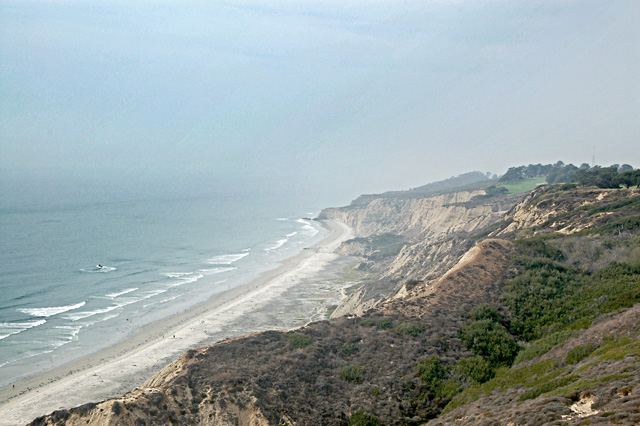Update 6/23: Property rights lost 5-4. More on Kelo decision here and here. The arguments below are still valid, even if the SCOTUS did not agree.
|

|
Photo: Welcome to New London. Note the small businesses, which will be happy to serve you until the town of New London takes their property away and gives it to someone they like better
|
As I have written before, there is a disgusting and increasingly popular trend among city governments to seize private property from one owner and give it to a developer who will build something that will generate more property taxes (e.g. seize house to build a new Home Depot). This theory of eminent domain is being tested in arguments in front of the Supreme Court around actions of New London, CT to seize private houses and handing them over to a developer so he can build a private marina. New London argues that it is economically depressed, and it needs to substitute some higher tax paying businesses for lower tax paying homeowners. Dahlia Lithwick in Slate brings us this telling exchange yesterday between the Court and New London attorney Horton:
Justice Antonin Scalia asks what difference it makes that New London is depressed. What if a city acknowledged that it wasn't doing badly, but just wanted to condemn land to attract new industry? He describes Horton's position as: "You can always take from A and give to B, so long as B is richer." And O'Connor offers this concrete example: What if there's a Motel 6 but the city thinks a Ritz-Carlton will generate more taxes? Is that OK?
Yes, says Horton.
"So you can always take from A and give to B if B pays more taxes?" asks Scalia.
"If they are significantly more taxes," says Horton
"But that will always happen. Unless it's a firehouse or a school," protests Kennedy.
The Court even gave New London's attorney a bit of a lesson on how free exchange of goods requires consent of both parties:
"We're paying for it!" Horton exclaims, noting that no one is taking anything from these minorities.
"But you're taking it from someone who doesn't want to sell. She doesn't want your money," retorts Scalia.
Professor Bainbridge points out why Mr. Horton's payment will also be inadequate:
First, it fails to take into account the subjective valuations placed on the property by people whose families have lived on the land, in at least one case, for a 100 years. In other words, if the Supreme Court rules for the city, the government will be able to seize land at a price considerably below the reservation price of the owners. Second, unlike the prototypical eminent domain case, in which the land is seized to build, say, a school or road, in this case the city is using eminent domain to seize property that will then be turned over to a private developer. If this new development increases the value of the property, all of that value will be captured by the new owner, rather than the forced sellers. As a result, the city will have made itself richer (through higher taxes), and the developer richer, while leaving the forced sellers poorer in both subjective and objective senses
Read the whole thing, its depressing, all the more so since commentators seem to feel that New London will prevail. To my eye, Mr Horton and New London look no different than Stalin-era Soviet planners. The Economist (sub. req'd)agrees:
Put simply, cities cannot take someone's house just because they think they can make better use of it. Otherwise, argues Scott Bullock, Mrs Kelo's lawyer, you end up destroying private property rights altogether. For if the sole yardstick is economic benefit, any house can be replaced at any time by a business or shop (because they usually produce more tax revenues). Moreover, if city governments can seize private property by claiming a public benefit which they themselves determine, where do they stop? If they decide it is in the public interest to encourage locally-owned shops, what would prevent them compulsorily closing megastores, or vice versa? This is central planning.
Plenty more commentary at Professor Bainbridge (here and here), Volokh (here and here), Cafe Hayek, and the Knowlege Problem. The Institute for Justice is defending the property owners and is at the forefront of this fight - win or lose, they deserve props for their efforts.
Postscript: I generally don't like the arguments I see in some blogs that go like "why aren't the ___________ [fill in with liberal or conservative] blogs addressing such-and-such issue?" Blogs are intensely personal, and since most of us write them as a hobby, there are always going to be issues that just don't really get us fired up. For example, though many libertarian bloggers expend numerous electrons on gun rights, the topic is generally a yawner for me so I seldom go there.
With that said, it is interesting to speculate where the "progressives" are on this case. When you see a story of a city making a virtue of taking from poorer people to give to rich developers, one would expect the left to go nuts. As reason describes it (here and here and here):
... a growing number of governments are using eminent domain to circumvent the conventional real estate market. Eminent domain forces property owners to sell their property to the city while the city then turns around and sells the property to developers. Private developers can reap significant financial gains through this process. Reason finds these decisions are increasingly driven by local politics, not respect for property rights, and give well-connected property developers significant advantages over homeowners and small businesses.
Little guy vs. big guy -- where is the Left? Well, the problem is that progressives generally support the erosion of private property rights. They like cases that reinforce the ability of government and politicians to take, redirect, or otherwise control private property for their own goals. In this case, I presume that they are willing to sacrifice a few little guys in Connecticut for the larger goal of increasing statism.
UPDATE: Apparently the New London attorney ended on a note of mystery, according to SCOTUSBlog:
The moment of the day came in Kelo when the city's counsel attempted to close by saying, "I want to leave you with just four words," then his time expired. (Although he did say -- using more words, "I see my time has expired so I won't be able to tell you them.") Justice Kennedy then asked the plaintiff's lawyer on rebuttal, "You don't happen to know what the four words were?" Regrettably, he didn't.
Here is my guess for New London's last four words: "Everything belongs to us". Of course "All your base are belong to us" would have been better, but that is seven words.





